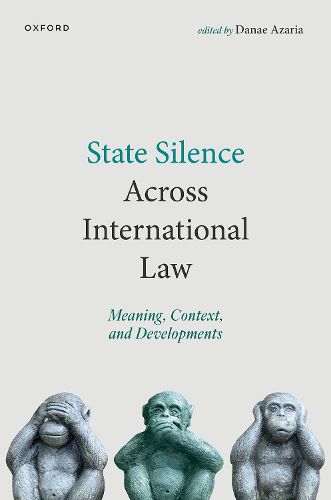Readings Newsletter
Become a Readings Member to make your shopping experience even easier.
Sign in or sign up for free!
You’re not far away from qualifying for FREE standard shipping within Australia
You’ve qualified for FREE standard shipping within Australia
The cart is loading…






The words and actions of states have a significant influence on international law. But what of silence and inaction? During the twentieth and twenty-first century, the framework of international law underwent profound transformation. As a result, the contexts in which State silence may be interpreted have become complex and are not well understood. In light of these new realities, this ground-breaking volume explores the evolving legal meaning and effects of State silence in international law-making. Across sixteen chapters, this book questions the circumstances that necessitate a State's reaction, the factors influencing a State's ability to respond, and how a period of silence should be assessed. It also investigates whether and how the shift in international law from bilateralism towards community interests, multilateralism, intergovernmental institutions, and expert bodies, including international courts and tribunals, affect the interpretation of State silence. Furthermore, it probes whether and how advancements in communication, the increased number of States, and their diverse characteristics influence this interpretation.Examining these issues across multiple facets of international law, the book demonstrates the ubiquity of State silence and its legal significance in different fields, and the contextual factors that come together to interpret State silence in a particular instance. Through this exploration, the broad question of state silence's role in either maintaining stability or enabling change is scrutinised. Featuring contributions from twenty-one experts, State Silence Across International Law is a must read for anyone interested in understanding state silence as a factor across different areas of law, including peace and security, international humanitarian law, international criminal law, and international economic law, among others.
$9.00 standard shipping within Australia
FREE standard shipping within Australia for orders over $100.00
Express & International shipping calculated at checkout
The words and actions of states have a significant influence on international law. But what of silence and inaction? During the twentieth and twenty-first century, the framework of international law underwent profound transformation. As a result, the contexts in which State silence may be interpreted have become complex and are not well understood. In light of these new realities, this ground-breaking volume explores the evolving legal meaning and effects of State silence in international law-making. Across sixteen chapters, this book questions the circumstances that necessitate a State's reaction, the factors influencing a State's ability to respond, and how a period of silence should be assessed. It also investigates whether and how the shift in international law from bilateralism towards community interests, multilateralism, intergovernmental institutions, and expert bodies, including international courts and tribunals, affect the interpretation of State silence. Furthermore, it probes whether and how advancements in communication, the increased number of States, and their diverse characteristics influence this interpretation.Examining these issues across multiple facets of international law, the book demonstrates the ubiquity of State silence and its legal significance in different fields, and the contextual factors that come together to interpret State silence in a particular instance. Through this exploration, the broad question of state silence's role in either maintaining stability or enabling change is scrutinised. Featuring contributions from twenty-one experts, State Silence Across International Law is a must read for anyone interested in understanding state silence as a factor across different areas of law, including peace and security, international humanitarian law, international criminal law, and international economic law, among others.